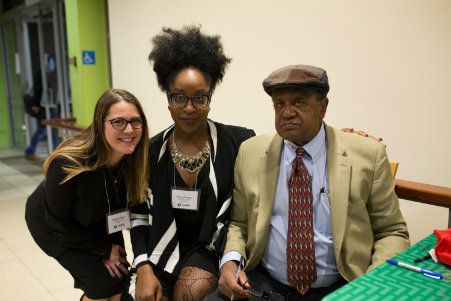Next week, the Lesley community and others will be examining police violence and other issues still confronting society, in a discussion led by members of the Cambridge and Boston chapters of Black Lives Matter.

Amanda Wager and Bwann Gwann of the Diversity Council with Bobby Seale.
The event is 4-6 p.m., Tuesday, March 28, in Marran Theater, and it is free and open to the public.
Maritsa Barros, director of our Urban Scholars Initiative, believes Black Lives Matter is nothing short of the contemporary incarnation of the civil-rights movement that was led by important and iconic figures from Rosa Parks and Bobby Seale (who spoke here on Feb. 27) and the Black Panthers, to Malcolm X and the Rev. Martin Luther King Jr.
“Black Lives Matter is no different than that of the era of the civil rights movement,” Barros insists. “It is simply of our time and more magnified with the new forms of technology that exist today.”
Earlier this year, Barros and Lilu Barbosa, director of multicultural affairs and student inclusion, led a program that featured several clips from the movie “The Meeting,” a fictionalized account of a discussion between Dr. King and Malcolm X, who debated their respective methods of effecting change. King speaks of the need to work within the system, while Malcolm X questions whether black people can achieve equality in any system built on slavery and oppression.
At that event, the several dozen attendees were prompted by Barros and Barbosa to evaluate both men’s arguments and tactics, and think about how their actions and philosophies relate to Black Lives Matter.
“Police brutality, racism and discrimination have been part of black history since slaves were transported to America,” Barros says. “I believe the philosophy of Malcolm X and Martin Luther King are both effective in different settings and scenarios.
"The conversations we had at the ('Meeting') event brought up many thoughts for me, especially in conjunction with some of the comments made by Bobby Seale during his visit to campus," Barbosa says. "One thing that has been salient for me and on my mind is the notion of access to power and the ability to utilize power to make decisions and implement change that will challenge existing institutional barriers and inequities.
"Bobby Seale talked about community members needing access to 'power seats' and I think about this concept in relation to work on college campuses and in greater society. In terms of working towards a place of institutional equity, I feel as though we need to always consider the institutional commitments to this work in terms of: administrative roles with positional power, infrastructure that aligns with and supports our strategic goals, and the presence of resources to effectively do the work in a sustainable fashion, for example."
The most obvious barrier is racism, on the institutional level, as well as overt and one-on-one.
Barbosa says looking at one's own prejudice is important, but the self-assessment must go further.
"We also need to be looking at how our personal biases influence decision-making, policy creation, recruitment channels, hiring practices, etc… and other protocols and procedures that shape our organizational landscape," he says.
But the road ahead is a long one.
“I would love it if we could live out the dream of (Dr. King)," Barros says, "but the reality is our systems in America are not designed for people of color to have an equal opportunity for success and power."